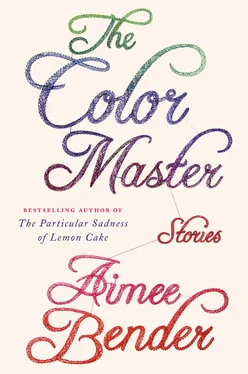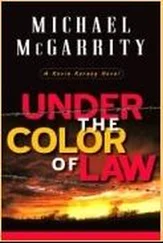“What?” I said. “Do I have brain damage? What? Who cares who’s who? I enjoy the general. What’s so wrong with that? Why is this important? If I meet the person and talk to them, I’ll know who they are then.”
My mother was silent.
The doctor was silent.
“Why did you say that?” asked the doctor, after a minute.
“What do you mean?”
“Why did you just say all that?”
“Because I hate snap judgments,” I said.
The doctor folded her arms.
“But how do you know?” she asked.
“How do I know what?”
“How do you know we’re making snap judgments?”
I unwrapped another candy. Green peppermint. “No reason,” I said. “My mother gave you a look.”
Now the doctor leaned against the wall.
“So you could see her look?”
“What do you mean?” I asked. “Didn’t she give you a look?”
“Yes,” Mom said. “I gave her a look.”
“But you could see your mother’s look,” said the doctor. “Why?”
“Why?”
“You can’t see an old man. You can’t see a soldier getting shot.”
“I know my mother’s face.”
“Can you see it now?”
I looked over. Truth was, I couldn’t really see her face. I could see big red lips because she was wearing lipstick because she likes to look nice for doctors.
“Make a face, Mrs. Robertson,” the doctor said.
She did something. What, I couldn’t tell.
“Can’t tell,” I said, sucking on the candy.
“But you could tell the earlier look,” said the doctor.
“Just sometimes,” I said. “Are we done?”
“Do you see me as a group?” asked the doctor then, in an all-too-friendly voice.
“I am not retarded,” I said, pulling my shirt back over my head. “I can see that you are one person, and that you have a ridiculously long neck.”
“William!” barked my mother.
“William, may I speak to your mother alone for a moment?” the doctor asked.
I stormed out. I emptied the entire lobby candy jar into my pockets and left the building. There was a candle shop next door, so I went in there and smelled wax for a while; the one that said it smelled like chocolate was wildly misleading. I have an excellent sense of smell. On the street, I tried to look at all the people walking by, but they just looked like walking people to me. I didn’t see why I needed to read their faces. Wasn’t there enough complication in the world already without having to take in the overload of details and universes in every single person’s fucking face?
The drive home was mostly silent. My mother didn’t wave at the drivers when she changed lanes, which is unlike her. In general, she’s at her best in the world with strangers, and gets great reassurance from a wave or a nod between cars. But on this drive home she changed lanes on her own without acknowledgment of anyone and was quiet until we pulled into the driveway.
“I just don’t understand,” is all she said then.
My dad walked in from work late that night, as usual, and found some frozen pizza thawing in the refrigerator by accident. It had never been cooked, but he didn’t bother to heat it up and just ate it cold. “Cold pizza,” he said, smiling at me, as little flecks of cheese fell to the floor. “It’s not the same,” I told him. When he was done, my mother asked if she could speak to him in the other room. Ginny was playing hospital with her torn stuffed animals, and I skulked around their door as they settled in the bedroom and I heard her whisper to my dad that we went today to the doctor who did lots of tests and was very kind and professional and William has a real problem and the doctor diagnosed him with facial illiteracy.
“Wait, what?” I said from the hallway. I leaned in the door frame. “She said what?”
My mother’s eyes were enormous. Okay, I could see them. My mom only, sometimes. My father’s hair was a mess from exhaustive mussing, and he said: “Facial illiteracy? What the hell is that?”
“He cannot read a face,” said my mother, wincing. “He cannot recognize facial or, for that matter, bodily signals. He can’t read people at all. And, Stan,” she said, “it’s true.”
“Oh, what ever ,” I said, kicking the door. “I bet the doctor made that name up right on the spot.”
“Go to bed, William.”
“It’s nine o’clock.”
“You’re a growing boy. Go to bed.”
“So what does it mean?” asked my father.
“I don’t know,” she said. “He may have to take special classes. On recognition. Of faces and people. Go to bed , William!”
I stayed by the door until she came and closed it on me.
Shoving my ear against the wood, I heard my father’s tones of mild protest and my mother’s rising pierce. “Soldiers!” she was saying. “All dead! He thought they were happy!”
At the TV, I found Ginny surrounded by her now mended stuffed toys, watching the sitcom about the people who work at the pet store and act like animals. She likes the boss, who talks like a monkey. I tried to look at each actor’s individual face, but all I saw were eyebrows and teeth. No one emerged from the parental bedroom for over an hour, and I fell asleep on the couch. That’s where I woke up with the first light of morning, covered with stuffed bears just barely held together by clusters of staples and tape.
(There was a moment, once. I was eating dinner with Mom, and Dad was at work late, and Ginny was at a friend’s house learning fractions. I barely remember this; it’s sort of made up, if you want to know the truth. But we were eating spaghetti and cottage cheese, and Mom looked at me, and then all of sudden it was like her face melted; the lines around her eyes all pointed down, arrows down her face to the lines around her mouth, which pointed down, and then her chin caught it all like a net, trapping all the down arrows and feeding them back into her jaw and lower lip, which drooped and sank from the weight.
She took a sip of her water.
“Mom, you okay?” I asked.
“Sure,” she said. “Why?”)
For about a month, I went to classes across town taught by the long-necked doctor. They involved me and her in a dark viewing room, looking at huge slides of babies’ faces crying and laughing, and I had to tell her which was which. The doctor was stupid, because she kept using the same set of slides, and each time she’d tell me which was which, not realizing that every slide had a small gold number embossed in the corner. I just made notes on my leg: 14 is laughing, 13 is sneezing, 12 is crying, 11 is sleeping, etc. Within two weeks, I got eight out of ten on the test (I missed two on purpose), and she seemed very pleased with both of us. “Let’s see how you do for now,” she said, and she let me have my Saturday mornings back, which I used to climb roofs and mess with people’s TV antennae.
(I was walking to school with Ginny. She was telling me about her verb project, where she is gathering underappreciated verbs, and putting them to use. “Look, I’m sauntering to school,” she said, doing a little trick with her feet. She tilted her head to the side for a second, and she’s a few years younger than me, and when she squinted, putting her lips to one side, for a second I thought she looked hot. I’m making this up. She’s nine. She crossed the street and yelled, “Behold you later!” over her shoulder.)
My mother did not pick me up from school again. She was back pounding the streets, looking for a job. She did interrogate me several times at the kitchen table when we were home at the same time, but by now I’d learned my lesson. “His name’s John Gath,” I said to her, as I ate my fifth piece of toast. “He talks the most of anyone, and he is the leader of the group. I like him the best, except on the days when he’s in a bad mood.”
Читать дальше













